Module 5 Unit 3 Language in use 课件(共20张PPT)外研版九年级下册
文档属性
| 名称 | Module 5 Unit 3 Language in use 课件(共20张PPT)外研版九年级下册 |

|
|
| 格式 | ppt | ||
| 文件大小 | 2.3MB | ||
| 资源类型 | 教案 | ||
| 版本资源 | 外研版 | ||
| 科目 | 英语 | ||
| 更新时间 | 2024-11-21 00:00:00 | ||
图片预览

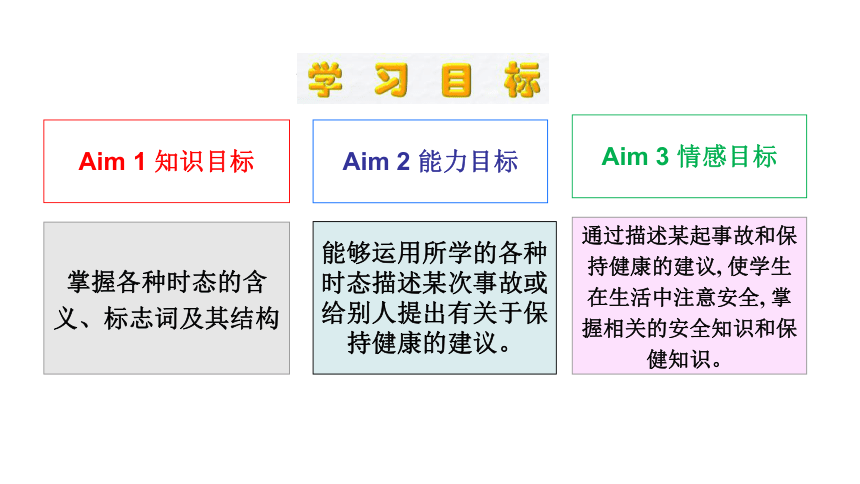
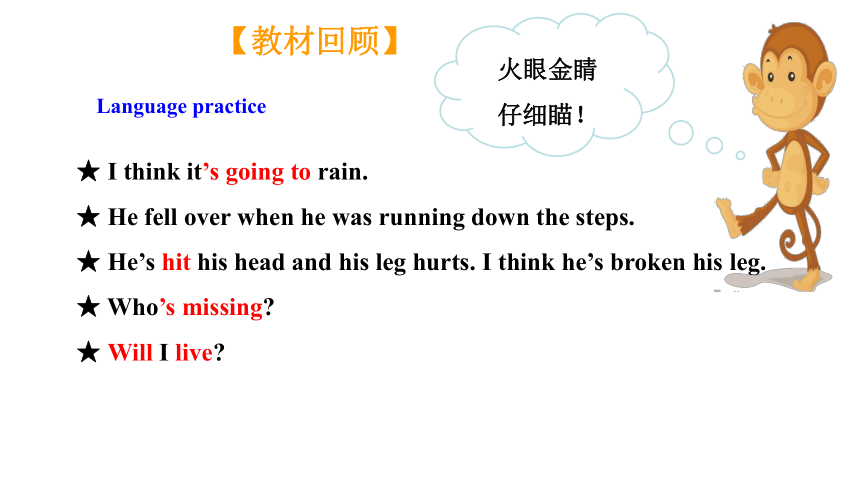
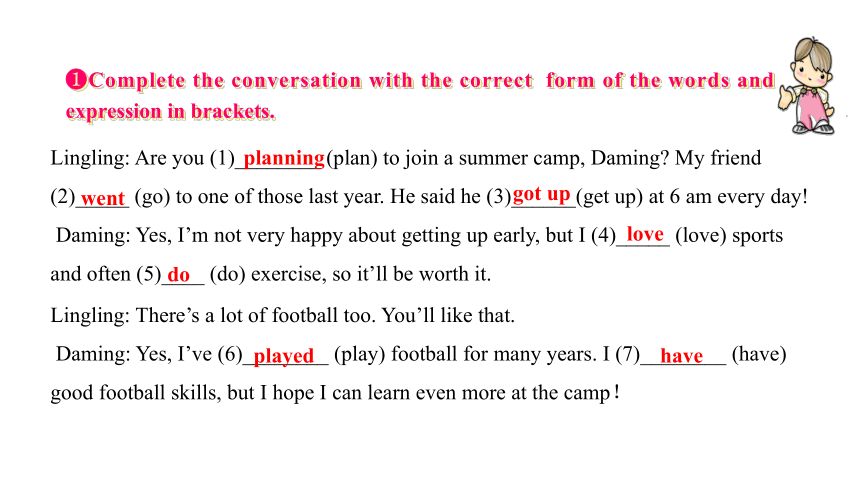

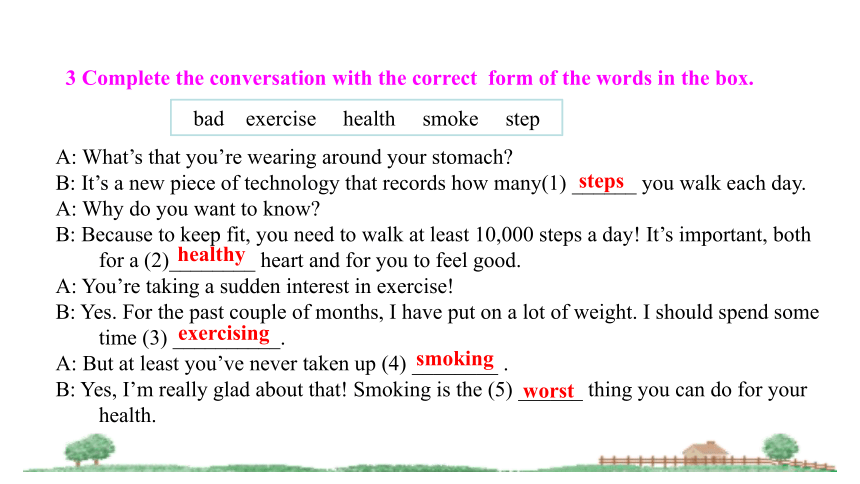
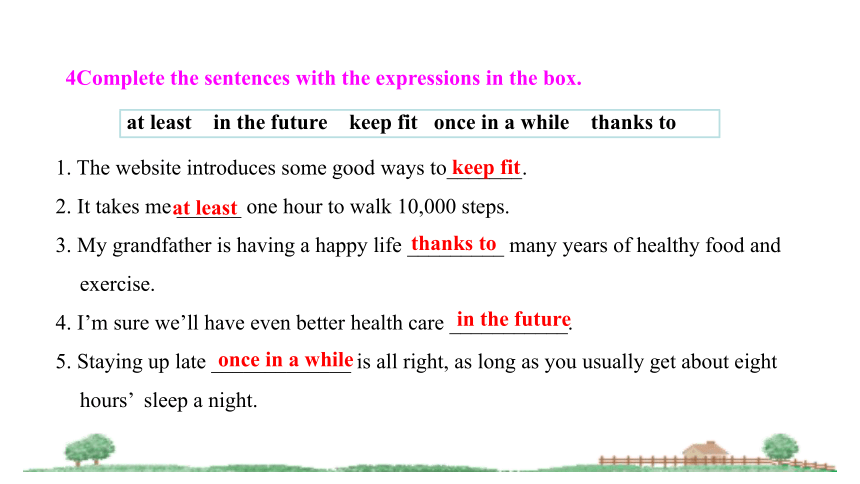
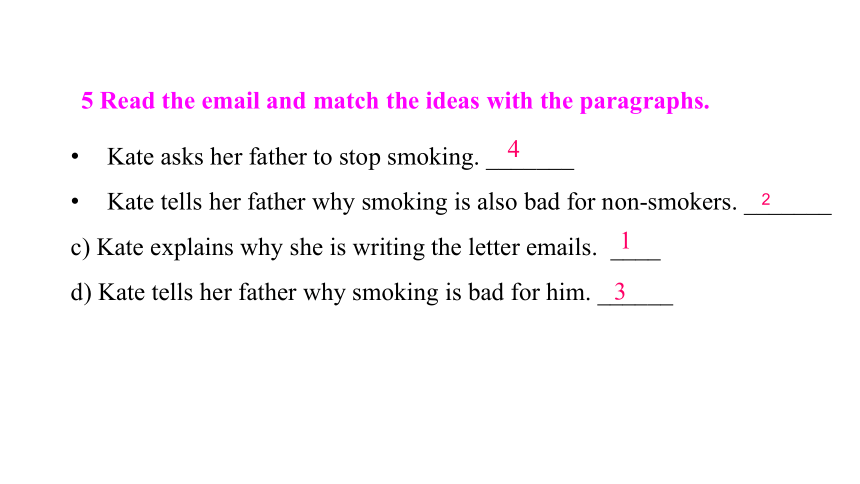
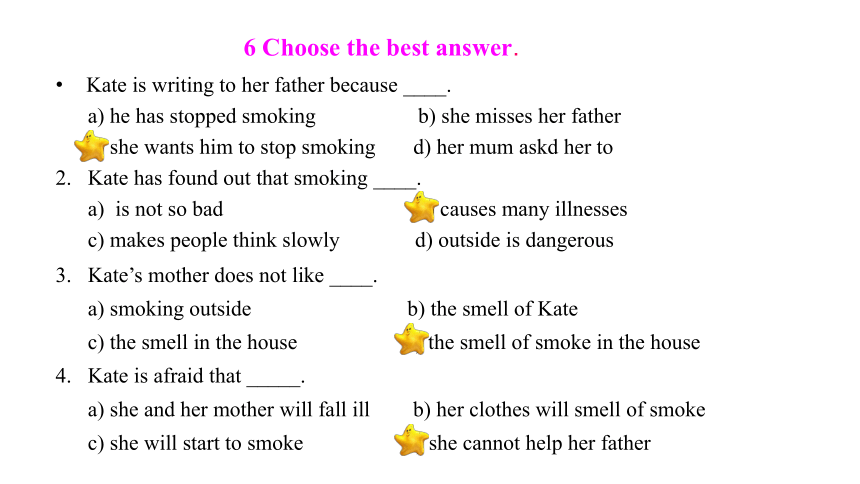
文档简介
(共20张PPT)
Module 5 Look after yourself
Unit 3 Language in use
掌握各种时态的含
义、标志词及其结构
Aim 1 知识目标
能够运用所学的各种时态描述某次事故或给别人提出有关于保持健康的建议。
Aim 2 能力目标
通过描述某起事故和保持健康的建议, 使学生在生活中注意安全, 掌握相关的安全知识和保健知识。
Aim 3 情感目标
★ I think it’s going to rain.
★ He fell over when he was running down the steps.
★ He’s hit his head and his leg hurts. I think he’s broken his leg.
★ Who’s missing
★ Will I live
火眼金睛仔细瞄!
Language practice
【教材回顾】
Lingling: There’s a lot of football too. You’ll like that.
Daming: Yes, I’ve (6)________ (play) football for many years. I (7)________ (have) good football skills, but I hope I can learn even more at the camp!
Lingling: Are you (1)________ (plan) to join a summer camp, Daming My friend (2)_____ (go) to one of those last year. He said he (3)______(get up) at 6 am every day!
Daming: Yes, I’m not very happy about getting up early, but I (4)_____ (love) sports and often (5)____ (do) exercise, so it’ll be worth it.
Complete the conversation with the correct form of the words and expression in brackets.
planning
went
got up
love
do
played
have
Naturally she thought her husband (5) ____________ (touch) the electricity. To pull him away from the cooker, she (6) ______ (hit) his arm
with a piece of wood. “What did you do that for ” he
cried in pain. “I (7) ___________ (make) some tea,
and (8) _______ (dance) to rock music on my MP3
player!”
Complete the passage with the correct form of the words in brackets.
A woman(1) _____ (come) home to find her husband in the kitchen. He (2) __________ (shake) wildly (剧烈地) from side to side. Then the woman (3) ______ (notice) that he (4) ____________ (stand) with one hand on the cooker!
came
was shaking
noticed
was standing
was touching
hit
was making
dancing
A: What’s that you’re wearing around your stomach
B: It’s a new piece of technology that records how many(1) ______ you walk each day.
A: Why do you want to know
B: Because to keep fit, you need to walk at least 10,000 steps a day! It’s important, both for a (2)________ heart and for you to feel good.
A: You’re taking a sudden interest in exercise!
B: Yes. For the past couple of months, I have put on a lot of weight. I should spend some time (3) __________.
A: But at least you’ve never taken up (4) ________ .
B: Yes, I’m really glad about that! Smoking is the (5) ______ thing you can do for your health.
bad exercise health smoke step
3 Complete the conversation with the correct form of the words in the box.
steps
healthy
exercising
smoking
worst
1. The website introduces some good ways to_______.
2. It takes me ______ one hour to walk 10,000 steps.
3. My grandfather is having a happy life _________ many years of healthy food and exercise.
4. I’m sure we’ll have even better health care ___________.
5. Staying up late _____________ is all right, as long as you usually get about eight hours’ sleep a night.
in the future
once in a while
at least in the future keep fit once in a while thanks to
thanks to
keep fit
at least
4Complete the sentences with the expressions in the box.
5 Read the email and match the ideas with the paragraphs.
Kate asks her father to stop smoking. _______
Kate tells her father why smoking is also bad for non-smokers. _______
c) Kate explains why she is writing the letter emails. ____
d) Kate tells her father why smoking is bad for him. ______
3
4
1
2
Kate is writing to her father because ____.
a) he has stopped smoking b) she misses her father
c) she wants him to stop smoking d) her mum askd her to
2. Kate has found out that smoking ____.
a) is not so bad b) causes many illnesses
c) makes people think slowly d) outside is dangerous
6 Choose the best answer.
3. Kate’s mother does not like ____.
a) smoking outside b) the smell of Kate
c) the smell in the house d) the smell of smoke in the house
4. Kate is afraid that _____.
a) she and her mother will fall ill b) her clothes will smell of smoke
c) she will start to smoke d) she cannot help her father
Around the world
Read the passage and discuss what the benefits of laughter are.
一般过去时
一般现在时
现在进行时
过去进行时
一般将来时
时态(tense)是一种动词形式,不同的时态用以表示不同的时间与方式,
它是表示行为、动作、状态在各种时间条件下的动词形式。本模块中,我们要
一起复习初中阶段所学过的六种基本时态:
现在完成时
Grammar——六种基本时态
一般现在时
用法: 经常性的和习惯性的动作。
常用时间状语: usually, sometimes, often, never, in spring, every day/ week/ year,
in the morning
动词构成 : 动词原形 do
动词+s(主语是第三人称单数)does
否定构成 : don’t+动词原形 doesn’t+动词原形
一般疑问句构成:Do\ Does+主语+动词原形 +其他?
简答: Yes, 主语+do. No, 主语+ doesn’t.
特殊疑问句举例 : What do you often do on Sundays Where does he live
注意: start, leave, go, come等的一般现在时可表示按规定将要发生的动作。
用法: 说话时正在进行的动作或当前一段时间正在进行的动作。
常用时间状语 : now, these days, at this moment
肯定构成 am/is/are+现在分词(-ing)
否定构成 am/is/are+not+现在分词(-ing)
一般疑问句构成 Am/Is/Are+主语+现在分词+ 其他?
简答: Yes, I am (he is) . No, they aren’t.
特殊疑问句举例 What are you doing now / Who is flying a kite there
现在进行时
注意:go, come, leave, arrive, return, die等的进行时,有时表示即将发生的动作。
用法: 将来会出现或发生的动作。
常用时间状语: this evening, tomorrow, next month/week/year, in a few minutes,
at the end of this term
肯定构成: 1. will/shall+动词原形 2.am/is/are going to+动词原形
以work为例: will/shall work am/is/are going to work 否定构成: will/shall not… am/is/are not going to…
特殊疑问句举例: What will you do tomorrow When are we going to have a class meeting
一般将来时
备注:在if条件状语从句或as soon as等时间状语从句中用一般现在时代替一般将来时。
用法: 过去时间发生的或过去经常性的动作。 常用时间状语: yesterday, last night/ week/year..., ... ago, in 2000等
动词构成: 动词过去式(-ed)
否定构成: didn’t+动词原形 didn’t work
一般疑问句构成:Did+主语+动词原形 +其他? 特殊疑问句举例:What did he do yesterday
When did he get up this morning
一般过去时
备注:He has opened the door.(表示过去“开门”的动作对现在的影响是门还开着)
He opened the door.(不能确定门现在是否还开着)
用法: 1.发生在过去且对现在仍有影响的动作,强调对现在的影响。
2.从过去一直延续到现在的动作。 常用时间状语: already, just, never, before, recently, in the past few years, ever,
so far, since+过去的时间点, for+时间段 肯定构成: have/has+过去分词(-ed)
否定构成: have/has not+过去分词
以work为例: have/has worked; have/has not worked
一般疑问构成: Have/Has+主语+过去分词…
特殊疑问句举例 What have you done recently How long has he lived in Beijing
现在完成时
备注:短暂性动词不能与for… , since…, How long…等表示时间段的短语同时使用。
用法: 过去某一时刻或某一段时间内正在发生的动作。 常用时间状语: at this time yesterday, at that time yesterday, at ten o’clock
yesterday 或when引导的从句 肯定构成: was/were+现在分词(-ing) was/were not+现在分词 以work为例: was/were working;was/ were not working
一般疑问句构成 Was/Were+主语+现在分词+其他? 简 答 Yes, I was. No, I wasn’t. 特殊疑问句举例 What were you doing at this time yesterday
Where was he standing when the teacher came in
过去进行时
知识方面
Revise& master the new words and expressions.
Revise& master some important sentences.
能够运用所学的各种时态描述某次事故或给别人提出有关于保持健康的建议。
能力方面
掌握了各种时态的含义、标志词及其结构。
1.There_________two meetings tomorrow afternoon.
A. are going to be B. are going to have C. is going to be D. will have
2. It______3 years since I___ to No.1 Middle School.
A. is; come B. is; have come C. was; came D. is; came
3.Father_________when I _________yesterday morning.
A. still slept; got up B. was still sleeping; got up
C. is sleeping; got up D. sleeps; get up
4. Kate_____ to bed until her mother_____ back.
A. won’t go;come B. hadn’t gone;came C. went;came D. didn’t go;came
The patient's illness worries others.
病人之病,忧人之忧。
Module 5 Look after yourself
Unit 3 Language in use
掌握各种时态的含
义、标志词及其结构
Aim 1 知识目标
能够运用所学的各种时态描述某次事故或给别人提出有关于保持健康的建议。
Aim 2 能力目标
通过描述某起事故和保持健康的建议, 使学生在生活中注意安全, 掌握相关的安全知识和保健知识。
Aim 3 情感目标
★ I think it’s going to rain.
★ He fell over when he was running down the steps.
★ He’s hit his head and his leg hurts. I think he’s broken his leg.
★ Who’s missing
★ Will I live
火眼金睛仔细瞄!
Language practice
【教材回顾】
Lingling: There’s a lot of football too. You’ll like that.
Daming: Yes, I’ve (6)________ (play) football for many years. I (7)________ (have) good football skills, but I hope I can learn even more at the camp!
Lingling: Are you (1)________ (plan) to join a summer camp, Daming My friend (2)_____ (go) to one of those last year. He said he (3)______(get up) at 6 am every day!
Daming: Yes, I’m not very happy about getting up early, but I (4)_____ (love) sports and often (5)____ (do) exercise, so it’ll be worth it.
Complete the conversation with the correct form of the words and expression in brackets.
planning
went
got up
love
do
played
have
Naturally she thought her husband (5) ____________ (touch) the electricity. To pull him away from the cooker, she (6) ______ (hit) his arm
with a piece of wood. “What did you do that for ” he
cried in pain. “I (7) ___________ (make) some tea,
and (8) _______ (dance) to rock music on my MP3
player!”
Complete the passage with the correct form of the words in brackets.
A woman(1) _____ (come) home to find her husband in the kitchen. He (2) __________ (shake) wildly (剧烈地) from side to side. Then the woman (3) ______ (notice) that he (4) ____________ (stand) with one hand on the cooker!
came
was shaking
noticed
was standing
was touching
hit
was making
dancing
A: What’s that you’re wearing around your stomach
B: It’s a new piece of technology that records how many(1) ______ you walk each day.
A: Why do you want to know
B: Because to keep fit, you need to walk at least 10,000 steps a day! It’s important, both for a (2)________ heart and for you to feel good.
A: You’re taking a sudden interest in exercise!
B: Yes. For the past couple of months, I have put on a lot of weight. I should spend some time (3) __________.
A: But at least you’ve never taken up (4) ________ .
B: Yes, I’m really glad about that! Smoking is the (5) ______ thing you can do for your health.
bad exercise health smoke step
3 Complete the conversation with the correct form of the words in the box.
steps
healthy
exercising
smoking
worst
1. The website introduces some good ways to_______.
2. It takes me ______ one hour to walk 10,000 steps.
3. My grandfather is having a happy life _________ many years of healthy food and exercise.
4. I’m sure we’ll have even better health care ___________.
5. Staying up late _____________ is all right, as long as you usually get about eight hours’ sleep a night.
in the future
once in a while
at least in the future keep fit once in a while thanks to
thanks to
keep fit
at least
4Complete the sentences with the expressions in the box.
5 Read the email and match the ideas with the paragraphs.
Kate asks her father to stop smoking. _______
Kate tells her father why smoking is also bad for non-smokers. _______
c) Kate explains why she is writing the letter emails. ____
d) Kate tells her father why smoking is bad for him. ______
3
4
1
2
Kate is writing to her father because ____.
a) he has stopped smoking b) she misses her father
c) she wants him to stop smoking d) her mum askd her to
2. Kate has found out that smoking ____.
a) is not so bad b) causes many illnesses
c) makes people think slowly d) outside is dangerous
6 Choose the best answer.
3. Kate’s mother does not like ____.
a) smoking outside b) the smell of Kate
c) the smell in the house d) the smell of smoke in the house
4. Kate is afraid that _____.
a) she and her mother will fall ill b) her clothes will smell of smoke
c) she will start to smoke d) she cannot help her father
Around the world
Read the passage and discuss what the benefits of laughter are.
一般过去时
一般现在时
现在进行时
过去进行时
一般将来时
时态(tense)是一种动词形式,不同的时态用以表示不同的时间与方式,
它是表示行为、动作、状态在各种时间条件下的动词形式。本模块中,我们要
一起复习初中阶段所学过的六种基本时态:
现在完成时
Grammar——六种基本时态
一般现在时
用法: 经常性的和习惯性的动作。
常用时间状语: usually, sometimes, often, never, in spring, every day/ week/ year,
in the morning
动词构成 : 动词原形 do
动词+s(主语是第三人称单数)does
否定构成 : don’t+动词原形 doesn’t+动词原形
一般疑问句构成:Do\ Does+主语+动词原形 +其他?
简答: Yes, 主语+do. No, 主语+ doesn’t.
特殊疑问句举例 : What do you often do on Sundays Where does he live
注意: start, leave, go, come等的一般现在时可表示按规定将要发生的动作。
用法: 说话时正在进行的动作或当前一段时间正在进行的动作。
常用时间状语 : now, these days, at this moment
肯定构成 am/is/are+现在分词(-ing)
否定构成 am/is/are+not+现在分词(-ing)
一般疑问句构成 Am/Is/Are+主语+现在分词+ 其他?
简答: Yes, I am (he is) . No, they aren’t.
特殊疑问句举例 What are you doing now / Who is flying a kite there
现在进行时
注意:go, come, leave, arrive, return, die等的进行时,有时表示即将发生的动作。
用法: 将来会出现或发生的动作。
常用时间状语: this evening, tomorrow, next month/week/year, in a few minutes,
at the end of this term
肯定构成: 1. will/shall+动词原形 2.am/is/are going to+动词原形
以work为例: will/shall work am/is/are going to work 否定构成: will/shall not… am/is/are not going to…
特殊疑问句举例: What will you do tomorrow When are we going to have a class meeting
一般将来时
备注:在if条件状语从句或as soon as等时间状语从句中用一般现在时代替一般将来时。
用法: 过去时间发生的或过去经常性的动作。 常用时间状语: yesterday, last night/ week/year..., ... ago, in 2000等
动词构成: 动词过去式(-ed)
否定构成: didn’t+动词原形 didn’t work
一般疑问句构成:Did+主语+动词原形 +其他? 特殊疑问句举例:What did he do yesterday
When did he get up this morning
一般过去时
备注:He has opened the door.(表示过去“开门”的动作对现在的影响是门还开着)
He opened the door.(不能确定门现在是否还开着)
用法: 1.发生在过去且对现在仍有影响的动作,强调对现在的影响。
2.从过去一直延续到现在的动作。 常用时间状语: already, just, never, before, recently, in the past few years, ever,
so far, since+过去的时间点, for+时间段 肯定构成: have/has+过去分词(-ed)
否定构成: have/has not+过去分词
以work为例: have/has worked; have/has not worked
一般疑问构成: Have/Has+主语+过去分词…
特殊疑问句举例 What have you done recently How long has he lived in Beijing
现在完成时
备注:短暂性动词不能与for… , since…, How long…等表示时间段的短语同时使用。
用法: 过去某一时刻或某一段时间内正在发生的动作。 常用时间状语: at this time yesterday, at that time yesterday, at ten o’clock
yesterday 或when引导的从句 肯定构成: was/were+现在分词(-ing) was/were not+现在分词 以work为例: was/were working;was/ were not working
一般疑问句构成 Was/Were+主语+现在分词+其他? 简 答 Yes, I was. No, I wasn’t. 特殊疑问句举例 What were you doing at this time yesterday
Where was he standing when the teacher came in
过去进行时
知识方面
Revise& master the new words and expressions.
Revise& master some important sentences.
能够运用所学的各种时态描述某次事故或给别人提出有关于保持健康的建议。
能力方面
掌握了各种时态的含义、标志词及其结构。
1.There_________two meetings tomorrow afternoon.
A. are going to be B. are going to have C. is going to be D. will have
2. It______3 years since I___ to No.1 Middle School.
A. is; come B. is; have come C. was; came D. is; came
3.Father_________when I _________yesterday morning.
A. still slept; got up B. was still sleeping; got up
C. is sleeping; got up D. sleeps; get up
4. Kate_____ to bed until her mother_____ back.
A. won’t go;come B. hadn’t gone;came C. went;came D. didn’t go;came
The patient's illness worries others.
病人之病,忧人之忧。
同课章节目录
- Module 1 Travel
- Unit 1 We toured the city by bus and by taxi
- Unit 2 It's a long story.
- Unit 3 Language in use
- Module 2 Education
- Unit 1 They don't sit in rows.
- Unit 2 What do I like best about school?
- Unit 3 Language in use
- Module 3 Life now and then
- Unit 1 They sometimes work harder.
- Unit 2 I think life is better today.
- Unit 3 Language in use.
- Module 4 Rules and suggestions
- Unit 1 You must be careful of falling stones.
- Unit 2 we must keep the camp clean.
- Unit 3 Language in use.
- Revison A
- Module 5 Look after yourself
- Unit 1 We'd better get you to hospital.
- Unit 2 Get off the sofa!
- Unit 3 Language in use.
- Module 6 Eating togethe
- Unit 1 When is the school-leavers' party?
- Unit 2 Knives and forks are used for most Western
- Unit 3 Language in use
- Module 7 English for you and me
- Unit 1 Have you ever been to an English corner?
- Unit 2 We all own English.
- Unit 3 Language in use
- Module 8 My future life
- Unit 1 Here's to our friendship and the future
- Unit 2 I know that you will be better at maths.
- Unit 3 Language in use
- Revison B
